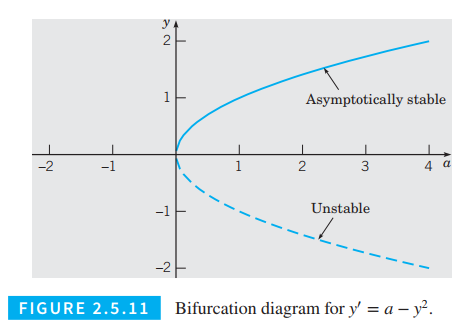
Concept explainers
Bifurcation Points. For an equation of the form
where
Consider the equation
Find all of the critical points for Eq. (ii). Observe that there are no critical points if
Draw the phase line in each case and determine whethereach critical point is asymptotically stable, semistable, or unstable.
In each case, sketch several solutions of Eq. (ii) in the
If we plot the location of the critical points as a function of

Want to see the full answer?
Check out a sample textbook solution
Chapter 2 Solutions
DIFFERENTIAL EQUATIONS W/WILEYPLUS
Additional Math Textbook Solutions
Using and Understanding Mathematics: A Quantitative Reasoning Approach (6th Edition)
College Algebra (7th Edition)
Algebra and Trigonometry (6th Edition)
Elementary Statistics
Thinking Mathematically (6th Edition)
Probability And Statistical Inference (10th Edition)
- Which degenerate conic is formed when a double cone is sliced through the apex by a plane parallel to the slant edge of the cone?arrow_forwardFor the problem below, what are the possible solutions for x? Select all that apply. 2 x²+8x +11 = 0 x2+8x+16 = (x+4)² = 5 1116arrow_forwardFor the problem below, what are the possible solutions for x? Select all that apply. x² + 12x - 62 = 0 x² + 12x + 36 = 62 + 36 (x+6)² = 98arrow_forward
- Select the polynomials below that can be solved using Completing the Square as written. 6m² +12m 8 = 0 Oh²-22x 7 x²+4x-10= 0 x² + 11x 11x 4 = 0arrow_forwardProve that the usual toplogy is firast countble or hot and second countble. ①let cofinte toplogy onx show that Sivast countble or hot and second firast. 3) let (x,d) be matricspace show that is first and second countble. 6 Show that Indiscret toplogy is firstand Second op countble or not.arrow_forwardH.W For any events A and B, show that 1. P(AB)s P(A)≤ P(AUB)≤ P(A) + P(B)arrow_forward
- a) Find the scalars p, q, r, s, k1, and k2. b) Is there a different linearly independent eigenvector associated to either k1 or k2? If yes,find it. If no, briefly explain.arrow_forwardPlz no chatgpt answer Plz Will upvotearrow_forward1/ Solve the following: 1 x + X + cos(3X) -75 -1 2 2 (5+1) e 5² + 5 + 1 3 L -1 1 5² (5²+1) 1 5(5-5)arrow_forward
- Algebra & Trigonometry with Analytic GeometryAlgebraISBN:9781133382119Author:SwokowskiPublisher:Cengage
 Functions and Change: A Modeling Approach to Coll...AlgebraISBN:9781337111348Author:Bruce Crauder, Benny Evans, Alan NoellPublisher:Cengage Learning
Functions and Change: A Modeling Approach to Coll...AlgebraISBN:9781337111348Author:Bruce Crauder, Benny Evans, Alan NoellPublisher:Cengage Learning Linear Algebra: A Modern IntroductionAlgebraISBN:9781285463247Author:David PoolePublisher:Cengage Learning
Linear Algebra: A Modern IntroductionAlgebraISBN:9781285463247Author:David PoolePublisher:Cengage Learning  College Algebra (MindTap Course List)AlgebraISBN:9781305652231Author:R. David Gustafson, Jeff HughesPublisher:Cengage Learning
College Algebra (MindTap Course List)AlgebraISBN:9781305652231Author:R. David Gustafson, Jeff HughesPublisher:Cengage Learning



